全国大学英语四级考试答题卡
英语四级考试作文和听力一套答题卡
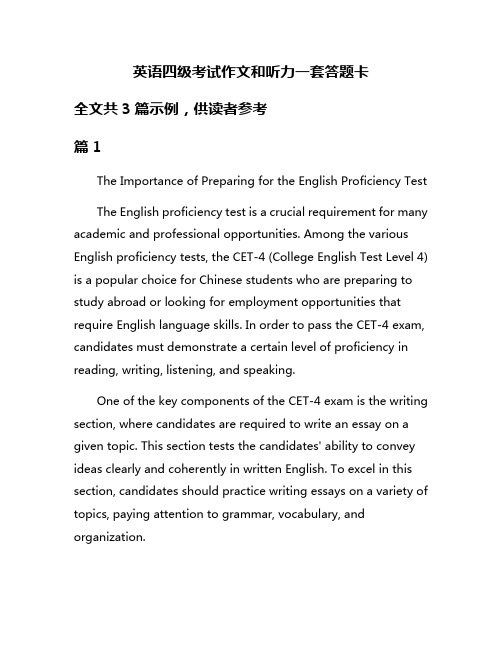
英语四级考试作文和听力一套答题卡全文共3篇示例,供读者参考篇1The Importance of Preparing for the English Proficiency TestThe English proficiency test is a crucial requirement for many academic and professional opportunities. Among the various English proficiency tests, the CET-4 (College English Test Level 4) is a popular choice for Chinese students who are preparing to study abroad or looking for employment opportunities that require English language skills. In order to pass the CET-4 exam, candidates must demonstrate a certain level of proficiency in reading, writing, listening, and speaking.One of the key components of the CET-4 exam is the writing section, where candidates are required to write an essay on a given topic. This section tests the candidates' ability to convey ideas clearly and coherently in written English. To excel in this section, candidates should practice writing essays on a variety of topics, paying attention to grammar, vocabulary, and organization.Another important component of the CET-4 exam is the listening section, where candidates listen to a series of recordings and answer questions based on the content. This section tests the candidates' ability to understand spoken English in different accents and contexts. To prepare for this section, candidates should listen to English podcasts, watch English movies and TV shows, and practice taking listening tests to improve their listening skills.In addition to the writing and listening sections, candidates must also prepare for the reading and speaking sections of the CET-4 exam. The reading section tests the candidates' ability to comprehend written English, while the speaking section tests their ability to communicate verbally in English. To succeed in these sections, candidates should practice reading English texts and engage in conversations in English with native speakers or fellow test-takers.To maximize their chances of success in the CET-4 exam, candidates should develop a comprehensive study plan that includes regular practice in all four language skills – reading, writing, listening, and speaking. Practice tests and mock exams can help candidates familiarize themselves with the format of the exam and identify areas that need improvement. Additionally,seeking guidance from English teachers or tutors can provide valuable feedback and tips on how to improve one's English proficiency.Ultimately, preparing for the English proficiency test requires dedication, consistency, and hard work. By devoting time and effort to improving their English skills, candidates can increase their chances of passing the CET-4 exam and achieving their academic and professional goals.篇2The English proficiency exam is a key part of many international students’ academic journey. For those pursuing a degree in an English-speaking country or looking to demonstrate their language skills for professional purposes, passing a standardized English exam is essential. One of the most popular English proficiency exams is the English four-level exam (CET-4).The CET-4 exam consists of listening, reading, writing, and translation sections, with the listening section often being considered the most challenging by test-takers. The listening section of the CET-4 exam requires candidates to listen to a series of recorded passages and answer questions based on thecontent. This section tests the candidate’s abili ty to comprehend spoken English, as well as their ability to follow and understand different accents, tones, and speeds of speech.To prepare for the listening section of the CET-4 exam, candidates should practice listening to a variety of English accents and dialects. This can be done by listening toEnglish-language podcasts, radio programs, TV shows, and movies. Additionally, candidates can take practice listening tests to familiarize themselves with the format of the exam and the types of questions that may be asked.When taking the listening section of the CET-4 exam, it is important to listen carefully and focus on key details. Candidates should take notes while listening to the passages to help them remember important information and details. It is also helpful to listen for keywords and phrases that may indicate the answer to a particular question.In addition to the listening section, the CET-4 exam also includes a writing section where candidates are required to write an essay on a specified topic. The writing section tests the candidate’s ability to communicate ideas and opinions effectively in written English. To prepare for the writing section,candidates should practice writing essays on a variety of topics and focus on organizing their ideas logically and cohesively.Overall, the English four-level exam is a challenging but important test for international students looking to demonstrate their English language proficiency. By practicing listening to a variety of English accents and dialects, taking practice tests, and honing their writing skills, candidates can increase their chances of success on the exam. With dedication and hard work, passing the CET-4 exam is achievable for anyone looking to prove their English language skills.篇3Title: English CET-4 Exam Essay and Listening Answer SheetIntroduction:The English CET-4 exam is an important milestone for Chinese students aiming to improve their English proficiency. One key component of this exam is the essay writing section and the listening comprehension section. In this article, we will provide tips and strategies for successfully completing these two sections.Essay Writing:The essay writing section of the CET-4 exam requires students to write a 200-250 word essay on a given topic within 30 minutes. To excel in this section, students need to practice their writing skills and develop their ability to express ideas clearly and effectively in English.Tips for writing a successful essay:1. Plan your essay before you start writing. Take some time to brainstorm ideas and create an outline of the main points you want to include.2. Use a variety of sentence structures and vocabulary to make your essay more engaging and interesting to read.3. Stick to the topic and avoid going off on tangents. Make sure every paragraph and sentence contributes to your main argument.4. Proofread your essay carefully to check for grammatical errors, spelling mistakes, and punctuation errors.Listening Comprehension:The listening comprehension section of the CET-4 exam requires students to listen to a series of recordings and answer questions based on what they hear. This section tests students'ability to understand spoken English and extract key information from the audio recordings.Tips for approaching the listening comprehension section:1. Practice listening to English audio materials regularly to improve your listening skills. This could include listening to podcasts, watching TV shows or movies in English, or listening to English songs.2. Pay attention to the instructions and question types before each recording. This will help you know what to listen for and what information to focus on.3. Take notes while listening to the recordings to help you remember key details and information.4. Try to answer as many questions as you can within the given time limit. If you are unsure of an answer, make an educated guess based on the information you have heard.Conclusion:The essay writing and listening comprehension sections of the English CET-4 exam are challenging but manageable with the right preparation and practice. By following the tips and strategies outlined in this article, students can improve theirperformance in these sections and increase their chances of success on the exam. Good luck!。
全国大学英语四级考试(CET-4)考生须知
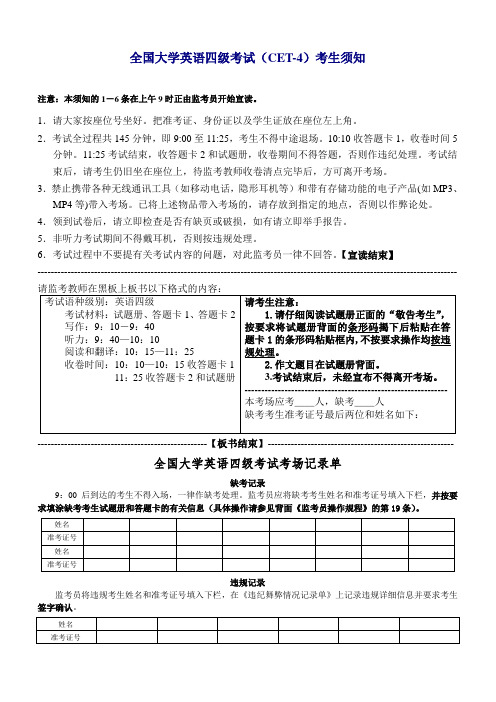
全国大学英语四级考试(CET-4)考生须知注意:本须知的1-6条在上午9时正由监考员开始宣读。
1.请大家按座位号坐好。
把准考证、身份证以及学生证放在座位左上角。
2.考试全过程共145分钟,即9:00至11:25,考生不得中途退场。
10:10收答题卡1,收卷时间5分钟。
11:25考试结束,收答题卡2和试题册,收卷期间不得答题,否则作违纪处理。
考试结束后,请考生仍旧坐在座位上,待监考教师收卷清点完毕后,方可离开考场。
3.禁止携带各种无线通讯工具(如移动电话,隐形耳机等)和带有存储功能的电子产品(如MP3、MP4等)带入考场。
已将上述物品带入考场的,请存放到指定的地点,否则以作弊论处。
4.领到试卷后,请立即检查是否有缺页或破损,如有请立即举手报告。
5.非听力考试期间不得戴耳机,否则按违规处理。
6.考试过程中不要提有关考试内容的问题,对此监考员一律不回答。
【宣读结束】---------------------------------------------------------------------------------------------------------------------------------------------------------------------------------【板书结束】--------------------------------------------------------全国大学英语四级考试考场记录单缺考记录9:00后到达的考生不得入场,一律作缺考处理。
监考员应将缺考考生姓名和准考证号填入下栏,并按要求填涂缺考考生试题册和答题卡的有关信息(具体操作请参见背面《监考员操作规程》的第19条)。
违规记录监考员将违规考生姓名和准考证号填入下栏,在《违纪舞弊情况记录单》上记录违规详细信息并要求考生签字确认。
考场号____缺考___人,违规___人,监考员签字:______,_________年__月__日全国大学英语四级考试(CET-4)监考员操作规程8¨15 监考 集中 1.监考员、工作人员到考务办公室报到,接受考点主考指示,主考宣布各考场监考员名单。
大学英语四级考试流程、试卷分值分配、答题卡样式

一、试卷描述
四级的试卷结构、测试内容、测试题型、分值比例和考试时间如下表所示:
二、新题型说明
1. 单词及词组听写
原复合式听写调整为单词及词组听写,短文长度及难度不变。
要求考生在听懂短文的基础上,用所听到的原文填写空缺的单词或词组,共10题。
短文播放三遍。
2.长篇阅读
原快速阅读理解调整为长篇阅读理解,篇章长度和难度不变。
篇章后附有10个句子,每句一题。
每句所含的信息出自篇章的某一段落,要求考生找出与每句所含信息相匹配的段落。
有的段落可能对应两题,有的段落可能不对应任何一题。
3. 翻译
原单句汉译英调整为段落汉译英。
翻译内容涉及中国的历史、文化、经济、社会发展等。
四级长度为140-160个汉字;六级长度为180-200个汉字。
三、成绩报道
成绩报道分为总分和单项分。
单项分包括:1听力,2)阅读,3)翻译和写作。
(自行了解)
温馨提醒:望大家熟悉考试时间、流程,以及试卷的结构,对做题时间要有所规划,做到有的放矢,切勿因某一题二浪费过多时间。
此外,听力考试时间比较紧,而且一完就收试卷,尽量听完一题就填涂一题(不是勾出答案就OK,而是直接涂至答题卡上)此提醒仅供参考,如有好的建议,望大家积极交流分享。
答题卡样式。
全国大学英语四级考试答题卡(高清可以打印和印刷)

填涂要求 正确涂卡 错误涂卡
Reading Comprehension
E FGHI E FGHI E FGHI E FGHI E FGHI
J K J KLMNO
E FGHI E FGHI E FGHI E FGHI E FGHI
J KLMNO J KLMNO J KLMNO J KLMNO J KLMNO
E FGHI J KLMNO P QR S E FGHI J KLMNO P QR S E FGHI J KLMNO P QR S E FGHI J KLMNO P QR S
E FGHI J KLMNO P QR S
E FGHI J KLMNO P QR S E FGHI J KLMNO P QR S E FGHI J KLMNO P QR S E FGHI J KLMNO P QR S E FGHI J KLMNO P QR S
(40 minutes)
答题卡2
Part IV
Translation
(30 minutes)
必须使用黑色字迹签字笔书写;在答题区域内作答,超出以下红色矩形边框限定区域的答案无效。
从此处开始作答
从此处开始作答
答题卡1
必须使用黑色字迹签字笔书写;在答题区域内作答,超出以下红色矩形边框限定区域的答案无效。
Part II
Listening Comprehension (听力录音播放完毕后,监考员将立即回收该卡)
(30 minutes)
学校: 姓名:
Part III
全国大学英语四级考试答题卡2
全国大学英语四级考试答题卡1
学校:
姓名:
填
正确涂卡
涂
要
求
错误涂卡
全国大学英语四级考试流程详细

全国大学英语四级考试流程详细英语四级的考试是一个英语力量全方位的考核,而不仅仅是单词的把握量,全国高校英语四级考试流程具体有哪些你知道吗?一起来看看全国高校英语四级考试流程具体,欢迎查阅!全国高校英语四级考试流程具体1、英语四级考试8:45考生进入考场全部考生一律携带身份证、同学证和准考证进入考场。
证件不全者,不得参与考试。
考生进入考场后,调试耳机。
2、英语四级考试9:00迟到考生不得入场,监考员发答题卡1和卡2考生用且只能用黑色字迹签字笔在答题卡上填写姓名、准考证号,用2B铅笔涂黑相应的信息点;暂不填写答题卡2上试卷一栏;考生不得提前答题,否则按违规违纪处理,并报省(教育)考试院处理。
3、英语四级考试9:10考试正式开头,开头做试题第一部分考生做试题第一部分“写作”,务必用黑色字迹签字笔答题。
4、英语四级考试9:35监考员发试题册考生不得提前翻阅或转变试卷位置,否则按违规违纪处理,并报省教育考试院处理。
5、英语四级考试9:40开头做试题的其次部分英语四级写作部分考试结束;考生打开试题册,开头做试题的其次部分“(快速阅读)理解”。
6、英语四级考试9:55收答题卡1收卷期间考生不得答题,否则按违规违纪处理,并报省教育考试院处理。
7、英语四级考试10:00听力考试正式开头。
8、英语四级听力考试结束后,开头做试题的第四部分英语四级听力考试结束后,请马上摘下耳机,否则按违规违纪处理,并报省教育考试院处理;考生开头做试题的第四部分。
9、英语四级11:20考试结束英语四级考试结束,考生马上停止答题,不离开座位,待监考老师收齐试卷、清点考试材料无误并同意考生离场后,考生方可退场。
10、考生不得提前退场和交卷英语四级考试过程中,考生不得提前退场,包括提前交卷,否则按违规违纪处理,并报省教育考试院处理。
11、考生进入考场需携带2B铅笔和黑色签字笔,不得携带(其它)材料考生进入考场不得携带的材料如书本、纸张、书包、录音器材、电子记事本和通讯工具(含BP机、对讲机和手机等均不得带入考场,否则按违规违纪处理,并报省教育考试院处理。
全国大学英语四级考试2答题卡1、答题卡2 正反印 2857份
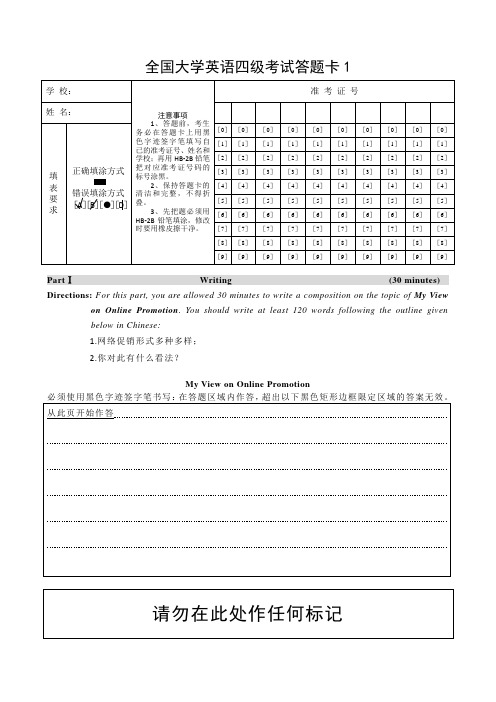
全国大学英语四级考试答题卡1PartⅠWriting (30 minutes) Directions:For this part, you are allowed 30 minutes to write a composition on the topic of My View on Online Promotion. You should write at least 120 words following the outline givenbelow in Chinese:1.网络促销形式多种多样;2.你对此有什么看法?My View on Online Promotion答题卡1必须使用黑色字迹签字笔书写:在答题区域内作答,超出以下黑色矩形边框限定区域的答案无效。
Part Ⅱ Reading Comprehension(Skimming and Scanning) (15 minutes)必须使用黑色字迹签字笔书写:在答题区域内作答,超出以下黑色矩形边框限定区域的答案无效1[A] [B] [C] [D] 2[A] [B] [C] [D] 3[A] [B] [C] [D] 4[A] [B] [C] [D] 5[A] [B] [C] [D] 6[A] [B] [C] [D] 7[A] [B] [C] [D]全国大学英语四级考试答题卡2Part Ⅲ Listening Comprehension 11[A][B][C][D] 16[A][B][C][D] 21[A][B][C][D] 26[A][B][C][D] 31[A][B][C][D] 12[A][B][C][D] 17[A][B][C][D] 22[A][B][C][D] 27[A][B][C][D] 32[A][B][C][D] 13[A][B][C][D] 18[A][B][C][D] 23[A][B][C][D] 28[A][B][C][D] 33[A][B][C][D] 14[A][B][C][D] 19[A][B][C][D] 24[A][B][C][D] 29[A][B][C][D] 34[A][B][C][D] 15[A][B][C][D] 20[A][B][C][D] 25[A][B][C][D] 30[A][B][C][D] 35[A][B][C][D]必须使用黑色字迹签字笔书写:在答题区域内作答,超出以下黑色矩形边框限定区域的答案无效。
大学英语四级模拟考试+答案+彩板答题卡知识点汇总
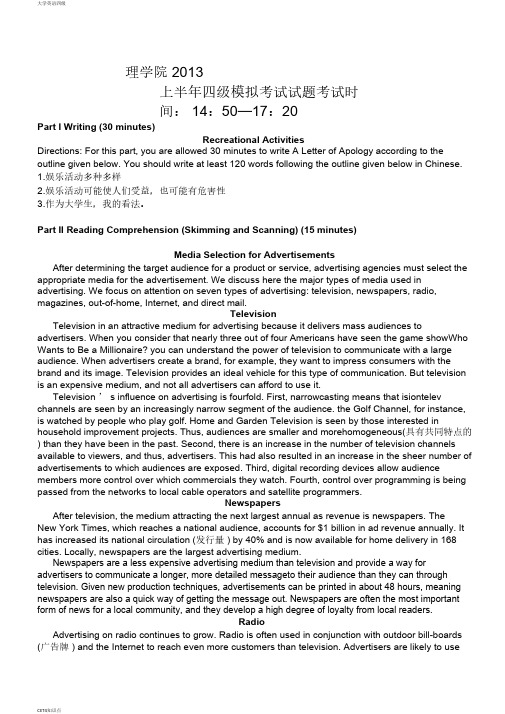
理学院 2013上半年四级模拟考试试题考试时间: 14:50—17:20Part I Writing (30 minutes)Recreational ActivitiesDirections: For this part, you are allowed 30 minutes to write A Letter of Apology according to the outline given below. You should write at least 120 words following the outline given below in Chinese.1.娱乐活动多种多样2.娱乐活动可能使人们受益,也可能有危害性3.作为大学生,我的看法。
Part II Reading Comprehension (Skimming and Scanning) (15 minutes)Media Selection for AdvertisementsAfter determining the target audience for a product or service, advertising agencies must select the appropriate media for the advertisement. We discuss here the major types of media used in advertising. We focus on attention on seven types of advertising: television, newspapers, radio, magazines, out-of-home, Internet, and direct mail.TelevisionTelevision in an attractive medium for advertising because it delivers mass audiences to advertisers. When you consider that nearly three out of four Americans have seen the game showWho Wants to Be a Millionaire? you can understand the power of television to communicate with a large audience. When advertisers create a brand, for example, they want to impress consumers with the brand and its image. Television provides an ideal vehicle for this type of communication. But television is an expensive medium, and not all advertisers can afford to use it.Television ’ s influence on advertising is fourfold. First, narrowcasting means that isiontelev channels are seen by an increasingly narrow segment of the audience. the Golf Channel, for instance, is watched by people who play golf. Home and Garden Television is seen by those interested in household improvement projects. Thus, audiences are smaller and morehomogeneous(具有共同特点的) than they have been in the past. Second, there is an increase in the number of television channels available to viewers, and thus, advertisers. This had also resulted in an increase in the sheer number of advertisements to which audiences are exposed. Third, digital recording devices allow audience members more control over which commercials they watch. Fourth, control over programming is being passed from the networks to local cable operators and satellite programmers.NewspapersAfter television, the medium attracting the next largest annual as revenue is newspapers. TheNew York Times, which reaches a national audience, accounts for $1 billion in ad revenue annually. It has increased its national circulation (发行量 ) by 40% and is now available for home delivery in 168 cities. Locally, newspapers are the largest advertising medium.Newspapers are a less expensive advertising medium than television and provide a way for advertisers to communicate a longer, more detailed messageto their audience than they can through television. Given new production techniques, advertisements can be printed in about 48 hours, meaning newspapers are also a quick way of getting the message out. Newspapers are often the most important form of news for a local community, and they develop a high degree of loyalty from local readers.RadioAdvertising on radio continues to grow. Radio is often used in conjunction with outdoor bill-boards (广告牌 ) and the Internet to reach even more customers than television. Advertisers are likely to useradio because it is a less expensive medium than television, which means advertisers can afford to repeattheir ads often. Internet companies are also turning to radio advertising. Radio provides a way for advertisers to communicate with audience members at all times of the day. Consumers listen to radioon their way to school or work, at work, on the way home, and in the evening hours.Two major changes—satellite and Internet radio—will force radio advertisers to adapt their methods. Both of these radio forms allow listeners to tune in stations that are more distant than thelocal stations they could receive in the past. As a result, radio will increasingly attract target audienceswho live many miles apart.MagazinesNewsweeklies, women’ s titles, and business magazines have all seen increases in advertisingbecause they attract the high-end market. Magazines are popular with advertisers because of the narrow market that they deliver. A broadcast medium such as network television attracts all types of audience members, but magazine audiences are more homogeneous. If you readSports Illustrated, for example,you have such in common with the magazine ’ s other readers. Advertisers see magazines as an efficie way of reaching target audience members.Advertisers using the print media—magazines and newspapers—will need to adapt to two main changes. First, the Internet will bring larger audiences to local newspapers. These audiences will bemore diverse and geographically dispersed (分散 ) than in the past. Second, advertisers will have to understand how to use an increasing number of magazines for their target audiences. Although some magazines will maintain national audiences, a large number of magazines will entertain narrower audiences.Out-of-home advertisingOut-of-home advertising, also called place-based advertising, has become an increasingly effectiveway of reaching consumers, who are more active than ever before. Many consumers today do not sit at home and watch television. Using billboards, newsstands, and bus shelters for advertising is an effectiveway of reaching these on-the-go consumers. More consumers travel longer distances to and from work, which also makes out-of-home advertising effective. Technology has changed the nature of the billboard business, making it a more effective medium than in the past. Using the digital printing, billboardcompanies can print a billboard in 2 hours, compared with 6 days previously. This allows advertisers more variety in the types of messages they create because they can change their messages more quickly.InternetAs consumers become more comfortable with online shopping, advertisers will seek to reach this market. As consumers get more of their news and information from the Internet, the ability of television and radio to get the word out to consumers will decrease.The challenge to Internet advertisers is to create ads that audience members remember.Internet advertising will play a more prominent role in organizations in the near’ advertisingfuture. Internet audiences tend to be quite homogeneous, but small. Advertisers will have to adjust their methods to reach these audiences and will have to adapt their persuasive strategies to the inline mediumas well.Direct mailA final advertising medium is direct mail, which uses mailings to consumers to communicate a client’ s message. Direct mail includes newsletters, postcards, and special promotion. Direct mail is aneffective way to build relationships with consumers. For many businesses, direct mail is the most effective form of advertising.1. Television is an attractive advertising medium in that ________.A) it has large audiences C) it helps build up a company ’ s reputationB) it appeals to housewives D) it is affordable to most advertisers2. With the increase in the number of TV channels, ________.A) the cost of TV advertising has decreased B) the number of TV viewers has increasedC) advertisers ’ interest in other media has decreasedD) the number of TV ads people can see has increased3. Compare with television, newspapers as an advertising medium _______.A) earn a larger annual ad revenue C) use more production techniquesB) convey more detailed messages D) get messages out more effectively4. Advertising on radio continues to grow because _______.A) more local radio stations have been set up C) it provides easy access to consumersB) modern technology makes it more entertaining D) it has been revolutionized by Internet radio5. Magazines are seen by advertisers as an efficient way to _______.A) reach target audiences C) attract diverse audiencesB) appeal to educated people D) convey all kinds of messages6. Out-of-home advertising has become more effective because _______.A) billboards can be replaced within two hours C) such ads have been made much more attractiveB) consumers travel more now than ever before D) the pace of urban life is much faster nowadays7. The challenge to Internet advertisers is to create ads that are ________.A) quick to update C) easy to remember accessB) pleasant to look at D) convenient to8. Internet advertisers will have to adjust their methods to reach audiences that tend to be _______.9. Direct mail is an effective form of advertising for business to develop ________.10. This passage discusses how advertisers select ________ for advertisements.Part III Listening Comprehension (35 minutes)Section A11. A) Given his ankle a good rest. C) Continue his regular activities.B) Treat his injury immediately. D) Be careful when climbing steps.12. A) On a train. B) On a plane. C) In a theater. D) In a restaurant.13. A) A tragic accident. C) Smith ’ s unusual life story.B) A sad occasion. D) Smith ’ s sleeping problem.14. A) Review the detail of all her lessons. C) Talk with her about his learning problems.B) Compare notes with his classmates. D) Focus in the main points of her lectures.15. A) The man blamed the woman for being careless. B) The man misunderstood the woman’ s apology.C) The woman off ered to pay for the man’ scoffee. D) The woman spilt coffee on the man’ s jacket.16. A) Extremely tedious. C) Lacking a good plot.B) Hard to understand. D) Not worth seeing twice.17. A) Attending every lecture. C) Reading very extensively.B) Doing lots of homework. D) Using test-taking strategies.18. A) The digital TV system will offer different programs. B) He is eager to see what the new systemis like.C) He thinks it unrealistic to have 500 channels. D) The new TV system may not provide anything better.Questions 19 to 22 are based on the conversation you have just heard.19. A) A notice by the electricity board. C) The description of a thief in disguise.B) Ads promoting electric appliances. D) A new policy on pensioners ’ welfare.20. A) Speaking with a proper accent. C) Making friends with them.B) Wearing an official uniform. D) Showing them his ID.21. A) To be on the alert when being followed. D) To watch out for those from the electricityB) Not to leave senior citizens alone at home. board.C) Not to let anyone in without an appointment.22. A) She was robbed near the parking lot. C) The pension she had just drawn was stolen.B) All her money in the bank disappeared. D) She was knocked down in the post office.Questions 23 to 25 are based on the conversation you have just heard.23. A) Marketing consultancy.B) Professional accountancy.24. A) Having a good knowledge of its customs.B) Knowing some key people in tourism.25. A) It will bring her potential into full play.B) It will involve lots of train travel. Section BPassage One C) Luxury hotel management.D) Business conference organization.C) Having been to the country before.D) Being able to speak Japanese.C) It will enable her to improve her Chinese.D) It will give her more chances to visit Japan.Questions 26 to 28 are based on the conversation you have just heard.26. A) The lack of time. C) The frustrations at work.B) The quality of life. D) The pressure on working families.27. A) They were just as busy as people of today. C) They didn’ t complain as much as modern man.B) They saw the importance of collective D) They lived a hard life by hunting and efforts. gathering.28. A) To look for creative ideas of awarding employees.B) To explore strategies for lowering production costs.C) To seek new approaches to dealing with complaints.D) To find effective ways to give employees flexibility.Passage TwoQuestions 29 to 31 are based on the conversation you have just heard.29. A) Family violence. C) Her father ’ s disloyalty.B) The Great Depression. D) Her mother ’ s bad temper.30. A) His advanced age. C) His improved financial condition.B) His children ’ s efforts. D) His second wife ’ s positive influence.31. A) Love is blind. C) Divorce often has disastrous consequences.B) Love breeds love. D) Happiness is hard to find in blended families. Passage ThreeQuestions 32 to 35 are based on the conversation you have just heard.32. A) It was located in a park.B) Its owner died of a heart attack.33. A) Planting some trees in the greenhouse.B) Writing a want ad to a local newspaper.34. A) Opening an office in the new office park.B) Keeping better relations with her company.35. A) Owning the greenhouse one day.B) Securing a job at the office park.Section C C) It went bankrupt all of a sudden.D) Its potted plants were for lease only.C) Putting up a Going Out of Business sign.D) Helping a customer select some purchases.C) Developing fresh business opportunities.D) Building a big greenhouse of his own.C) Cultivating more potted plants.D) Finding customers out of town.We’ re now witnessing the emergence of an advanced economy based on information and knowledge. Physical (36) ________, raw materials, and capital are no longer the key (37) ________ in the creation of wealth. Now, the (38) _______ raw material in our economy is knowledge. Tomorrow’ swealth depends on the development and exchange of knowledge. And (39) _______ entering the workforce offer their knowledge, not their muscles. Knowledge workers get paid for their education and their ability to learn. Knowledge workers (40) ________ in mind work. They deal with symbols: (41)________, and data.What does all this mean for you? As a future knowledge worker, you can expect to be (42) ________, processing, as well as exchanging information, (43) _______, three out of hour jobs involve some form of mind work, and that number will increase sharply in the future. Management and employees alike(44)_______________________________________________________________________.In the new world of work, you can look forward to being in constant training(45)_______________________________________________________________.And don’ t wait for someone to ― empower‖ you. You have to empower yourself.Part IV Reading Comprehension (Reading in Depth) (25 minutes)Section ASome years ago I was offered a writing assignment that would require three months of travelthrough Europe. I had been abroad a couple of times, but I could hardly _47_ to know my way aroundthe continent. Moreover, my knowledge of foreign languages was _48_ to a little college French.I hesitated. How would I, unable to speak the language, _49_ unfamiliar with local geography or transportation systems, set up _50_ and do research? It seemed impossible, and with considerable _51_I sat down to write a letter begging off. Halfway through, a thought can through my mind: you can learnif you don’. tSotry I accepted the assignment.There were some bad _52_. But by the time I had finished the trip I was an experienced traveler. Andever since, I have never hesitated to head for even the most remote of places, without guiders or even_53_ bookings, confident that somehow I will manage.The point is that the new, the different, is almost by definition _54_. But each time you try something, you learn, and as the learning piles up, the world opens to you.I ’ ve learned to ski at 40, and flown up the Rhine River in a _55_. And I know I ’ ll g things. It ’ s not because I ’ m braver or moreothersdaring. Ithan’ m not. But I’ ll accept anxiety as anoth name for challenge and I believe I can _56_ wonders.A) accomplish E) constantly I) manufacture M) regretB) advanced F) declare J) moments N) scaryC) balloon G) interviews K) news O) totallyD) claim H)limited L) reducedSection BPassage OneGlobal warming may or may not be the great environmental crisis of the 21st century, but regardlessof whether it is or isn’ t– we won’ t do muchWe aboutwillargueit. over it and may even, as a nation,make some fairly solemn-sounding commitments to avoid it. But the more dramatic and meaningfulthese commitments seem, the less likely they are to be observed.Al Gore calls global warming an―inconvenient truth,‖as if merely recognizing it could put u path to a solution. But the real truth is that we don’knowt enough to relieve global warming, and–without major technological breakthroughs— we can ’ t do much about it.From 2003 to 2050, the world’ s population is projected to grow from 6.4 billion to 9.1 billion, a 42% increase. If energy use per person and technology remain the same, total energy use and greenhousegas emissions (mainly, CO2) will be 42% higher in 2050. but that ’toos low, becausesocieties that grow richer use more energy. We need economic growth unless we condemn the world’ s poor to the poverty and freeze everyone else living’sstandards. With mod est growth, energy use and greenhouse emissions more than double by 2050.No government will adopt rigid restrictions on economic growth and personal freedom (limits on electricity usage, driving and travel) that might cut back global warming. Still, politicians want to showthey ’ re―doing something.‖ConsiderKyoto Protocolthe (京都议定书). It allowed countries that joinedto punish those that didn’ t. But it hasn’ t reduced CO2 emissions (up about 25% since 1990), an signatories (签字国 ) didn’ t adopt toughnoughe policies to hit their 2008-2012 targets.The practical conclusion is that if global warming is a potential disaster, the only solution is new technology. Only an aggressive research and development program might find ways of breaking dependence on fossil fuels or dealing with it.The trouble with the global warming debate is that it has become a moral problem when itengineering one. The inconvenient truth is that if we don’ tsolve the engineering problem, we’ re helpless.57. What is said about global warming in the first paragraph?A) It may not prove an environmental crisis at all.it.B) It is an issue requiring world wide D) Very little will be done to bring it under commitments.control.C) Serious steps have been taken to avoid or stop58. According to the author’ s understanding, what is Al Gore’ s view on global warming?A) It is a reality both people and politicians are unaware of.B) It is a phenomenon that causes us many inconveniences.C) It is a problem that can be solved once it is recognized.D) It is an area we actually have little knowledge about.59. Green house emissions will more than double by 2050 because of _______.A) economic growth C) wasteful use of energyB) the widening gap between the rich and poor D) the rapid advances of science and technology60. The author believes that, since the signing of the Kyoto Protocol, ________.A) politicians have started to do something to better the situationB) few nations have adopted real tough measures to limit energy useC) reductions in energy consumption have greatly cut back global warmingD) international cooperation has contributed to solving environmentalproblems 61. What is the message the author intends to convey?A) Global warming is more of a moral issue than a practical one.D) People have to give up certain material comforts to stop global warming.Passage TwoSomeday a stranger will read your e-mail without your permission or scan the Websites you’ ve visited. Or perhaps someone will casually glance through your credit card purchase or cell phone bills to find out your shopping preferences or calling habits.In fact, it ’ s likely some of these things have already happened to you. Who would watch you without your permission? It might be a spouse, a girlfriend, a marketing company, a boss, a cop or a criminal. Whoever it is, they will see you in a way you never intended to be seen— the 21st century equivalent of being caught naked.Psychologists tell us boundaries are healthy, that it’ s importantyourselfotofri e nds,veal familyand lovers in stages, at appropriate times. But few boundaries remain. The digital bread crumbs (碎屑) you leave everywhere make it easy for strangers to reconstruct who you are, where you are and what you like. In some cases, a simple Google search can reveal what you think. Like it or not, increasingly we live in a world where you simple cannot keep a secret.The key question is: Does that matter?When opinion polls ask Americans about privacy, most say they are concerned about losing it. A survey found an overwhelming pessimism about privacy, with 60 percent of respondentssaying theyfeel their privacy is―slipping away, and that bothers me.‖But people say one thing and do another. Only a tiny fraction of Americans change any behaviors in an effort to preserve their privacy. Few people turn down a discount at tollbooths (收费站 ) to avoid using the EZ-Pass system that can track automobile movements. And few turn down supermarket loyalty cards. Privacy economist Alessandro Acquisti has run a series of tests that reveal people will surrender personal information like Social Security numbers just to get their hands on a pitiful 50-cents-offcoupon (优惠券 ).But privacy does matter –at least sometimes. It’ s like health: When you have it, you donOnly when it’ s gone do you wish you’ d done more to protect it.62. What does the author mean by saying st century―the 21equivalent of being caught naked-4,‖ (Lines Para.2)?A) People ’ s personal information is easily accessed withouttheir knowledge.stB) In the 21 century people try every means to look into others’ secrets.C) People tend to be more frank with each other in the information age.D) Criminals are easily caught on the spot with advanced technology.63. What would psychologists advise on the relationships betweenfriends? A) Friends should open their hearts to each other. friends.B) Friends should always be faithful to each D) There should be fewer disputes between other.friends.C) There should be a distance even between64. Why does the author say ― welive in a world where you simple cannot keep a secret ‖(Line 5,Para.3)?A) Modern society has finally evolved into an open society.B) People leave traces around when using modern technology.C) There are always people who are curious about others’ affairs.D) Many search engines profit by revealing people’ s identities.65. What do most Americans do with regard to privacy protection?A) They change behaviors that might disclose their identity.B) They use various loyalty cards for business transactions.C) They rely more and more on electronic D) They talk a lot but hardly do anything about it. devices.66. According to the passage, privacy is like health in that ________.A) people will make every effort to keep it C) it is something that can easily be lostB) its importance is rarely understood D) people don’ t cherish it until they lose itPart VCloze(15 minutes)Universities are institution that teach a wide variety of subjects at advanced levels. They also carryout research work aimed _67_ extending man’ sknowledge of these subjects. The emphasis given toeach of these functions _68_ from university to university, according to the views of the people in _69_and according to the resources available. The smaller and newer universities do not _70_ the staff or equipment to carry out the _71_ research projects possible in larger institutions._72_ most expertsagree that some research activity is _73_ to keep the staff and their students in _74_ with the latest developments in their subjects.Most students attend a university mainly to _75_the knowledge needed for their chosen _76_. Educationists believe that this aim should not be the _77_one. Universities have always aimed to produce men and women _78_ judgment and wisdom as well as knowledge. For this reason, they _79_ students to meet others with differing _80_ and to read widely to _81_ their understanding in many fieldsof study._82_a secondary school course, a student should be interested enough in a subject to enjoy gaining knowledge for its own _83_. He should be prepared to_84_ sacrifices to study his chosen_85_ in depth. He should have an ambition to make some 86 contribution to man ’ s knowledg67. A) at B) by C) to D) in68.A) turns B) ranges C) moves D) varies69.A) prospect B) place C) control D) favor70.A) occupy B) possess C) involve D) spare71.A) maximum B) medium C) virtual D) vast72.A) But B) As C) While D) For73.A) natural B) essential C) functional D) optional74.A) coordination B) accordance C) touch D) grasp75.A) acquire B) accept C) endure D) ensure。
大学英语四级考试(CET4)模拟试题及答案
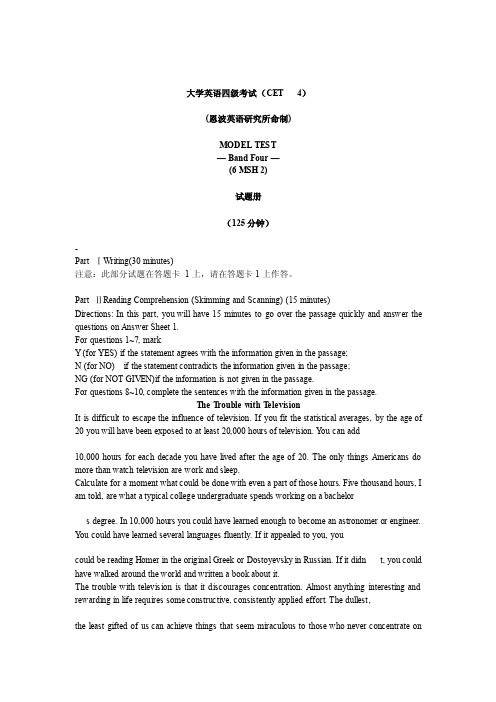
大学英语四级考试(CET 4)(恩波英语研究所命制)MODEL TEST— Band Four —(6 MSH 2)试题册(125分钟)-Part ⅠWriting(30 minutes)注意:此部分试题在答题卡1上,请在答题卡1上作答。
Part ⅡReading Comprehension (Skimming and Scanning) (15 minutes)Directions: In this part, you will have 15 minutes to go over the passage quickly and answer the questions on Answer Sheet 1.For questions 1~7, markY (for YES) if the statement agrees with the information given in the passage;N (for NO) if the statement contradicts the information given in the passage;NG (for NOT GIVEN)if the information is not given in the passage.For questions 8~10, complete the sentences with the information given in the passage.The T rouble with T elevisionIt is difficult to escape the influence of television. If you fit the statistical averages, by the age of 20 you will have been exposed to at least 20,000 hours of television. Y ou can add10,000 hours for each decade you have lived after the age of 20. The only things Americans do more than watch television are work and sleep.Calculate for a moment what could be done with even a part of those hours. Five thousand hours, I am told, are what a typical college undergraduate spends working on a bachelors degree. In 10,000 hours you could have learned enough to become an astronomer or engineer. Y ou could have learned several languages fluently. If it appealed to you, youcould be reading Homer in the original Greek or Dostoyevsky in Russian. If it didn t, you could have walked around the world and written a book about it.The trouble with television is that it discourages concentration. Almost anything interesting and rewarding in life requires some constructive, consistently applied effort. The dullest,the least gifted of us can achieve things that seem miraculous to those who never concentrate onanything. But television encourages us to apply no effort. It sells us instantgratification(满意). It diverts us only to divert, to make the time pass without pain. Television s variety becomes a narcotic(麻醉的), nor a stimulus. Its serial, kaleidoscopic (万花筒般的)exposures force us to follow its lead. The viewer is on a perpetual guidedtour: 30 minutes at the museum, 30 at the cathedral, 30 for a drink, then back on the bus to the next attraction—except on television, typically, the spans allotted arc on theorder of minutes or seconds, and the chosen delights are more often car crashes and people killing one another. In short, a lot of television usurps(篡夺;侵占)one of the mostprecious of all human gifts, the ability to focus your attention yourself, rather than just passively surrender it.Capturing your attention—and holding it—is the prime motive of most television programming and enhances its role as a profitable advertising vehicle. Programmers live in constantfear of losing anyone s attention—anyone s. The surest way to avoid doing so is to keep everything brief, not to strain the attention of anyone but instead to provide constantstimulation through variety, novelty, action and movement. Quite simply, television operates on the appeal to the short attention span.It is simply the easiest way out. But it has come to be regarded as a given, as inherent in the medium itself; as an imperative, as though General Sarnoff, or one of the other augustpioneers of video, had bequeathed(遗留;传于)to us tablets of stone commanding that nothing in television shall ever require more than a few moments Concentration.In its place that is fine. Who can quarrel with a medium that so brilliantly packages escapist entertainment as a mass marketing tool? But I see its values now pervading this nationand its life. It has become fashionable to think that, like fast food, fast ideas are the way to get to a fast moving, impatient public.In the case of news, this practice, in my view, results in inefficient communication. I question how much of television s nightly news effort is really absorbable and understandable.Much of it is what has been aptly described as “machine gunning with scraps.”I think the technique fights coherence. I think it tends to make things ultimately boring (unless theyare accompanied by horrifying pictures) because almost anything is boring if you know almost nothing about it.I believe that TV s appeal to the short attention span is not only inefficient communication but decivilizing as well. Consider the casual assumptions that television tends tocultivate: that complexity must be avoided, that visual stimulation is a substitute for thought, thatverbal precision is an anachronism. It may be old fashioned, but I was taughtthat thought is words, arranged in grammatically precise.There is a crisis of literacy in this country. One study estimates that some 30 million adult Americans are “functionally illiterate” and cannot read or write well enough to answer thewant ad or understand the instructions on a medicine bottle.Literacy may not be an inalienable human right, but it is one that the highly literate Founding Fathers might not have found unreasonable or even unattainable. We are not only notattaining it as a nation, statistically speaking, but we are falling further and further short of attaining it. And, while I would not be so simplistic as to suggest that television is thecause, I believe it contributes and is an influence.Everything about this nation—the structure of the society, its forms of family organization, its economy, its place in the world—has become more complex, not less. Y et itsdominating communications instrument, its principal form of national linkage, is one that sells neat resolutions to human problems that usually have no neat resolutions. It is allsymbolized in my mind by the hugely successful art form that television has made central to the culture, the 30 second commercial: the tiny drama of the earnest housewife whofinds happiness in choosing the right toothpaste.When before in human history has so much humanity collectively surrendered so much of its leisure to one toy, one mass diversion? When before has virtually an entire nationsurrendered itself wholesale to a medium for selling?Some years ago Y ale University law professor Charles L. Black. Jr. wrote: “… forced feeding on trivial fare is not itself a trivial matter. I think this society is being forced, fed with trivialfare, and I fear that the effects on our habits of mind, our language, our tolerance for effort, and our appetite for complexity are only dimly perceived. If I am wrong, we will havedone no harm to look at the issue skeptically and critically, to consider how we should be residing it. I hope yo u will join with me in doing so.”注意:此部分试题在答题卡1上作答;8~10题在答题卡1上。
09-06 CET-4 答题卡 1&2
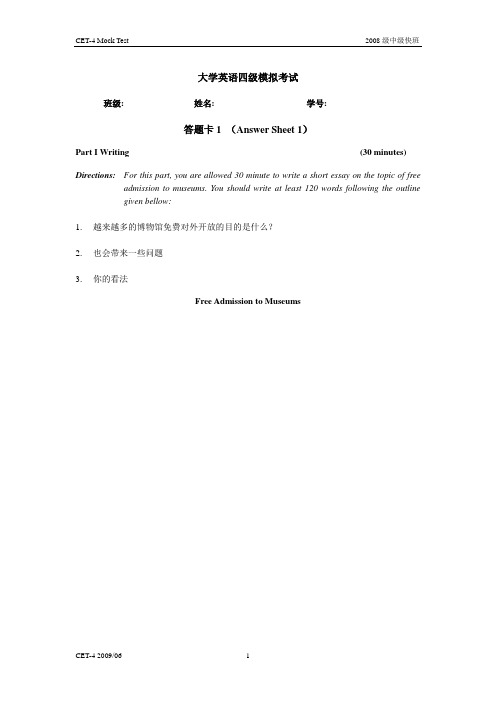
大学英语四级模拟考试班级:_______________ 姓名:__________________ 学号:_______________答题卡1 (Answer Sheet 1)Part I Writing (30 minutes)Directions: For this part, you are allowed 30 minute to write a short essay on the topic of free admission to museums. You should write at least 120 words following the outlinegiven bellow:1. 越来越多的博物馆免费对外开放的目的是什么?2. 也会带来一些问题3. 你的看法Free Admission to Museums______________________________________________________________________________ ______________________________________________________________________________ ______________________________________________________________________________ ______________________________________________________________________________ ______________________________________________________________________________ ______________________________________________________________________________ ______________________________________________________________________________ ______________________________________________________________________________ ______________________________________________________________________________ ______________________________________________________________________________ ______________________________________________________________________________ ____________________________________________________________________________________________________________________________________________________________ ______________________________________________________________________________ ______________________________________________________________________________ ______________________________________________________________________________ ______________________________________________________________________________ ______________________________________________________________________________ ______________________________________________________________________________ ______________________________________________________________________________ ______________________________________________________________________________ ______________________________________________________________________________ ______________________________________________________________________________ ______________________________________________________________________________ ______________________________________________________________________________ ______________________________________________________________________________ ______________________________________________________________________________PartⅡReading Comprehension (Skimming and Scanning) (15 minutes)注意:请将题目1~7的答案涂在机读卡上。
全国大学英语四级考试(CET-4)考生须知
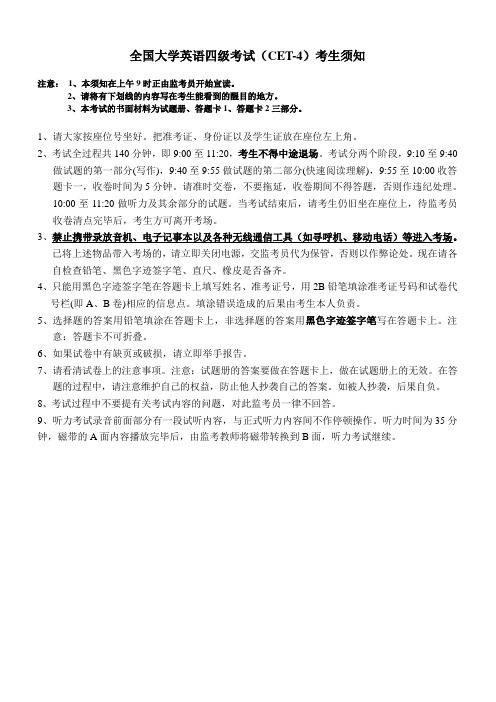
全国大学英语四级考试(CET-4)考生须知注意:1、本须知在上午9时正由监考员开始宣读。
2、请将有下划线的内容写在考生能看到的醒目的地方。
3、本考试的书面材料为试题册、答题卡1、答题卡2三部分。
1、请大家按座位号坐好。
把准考证、身份证以及学生证放在座位左上角。
2、考试全过程共140分钟,即9:00至11:20,考生不得中途退场。
考试分两个阶段,9:10至9:40做试题的第一部分(写作),9:40至9:55做试题的第二部分(快速阅读理解),9:55至10:00收答题卡一,收卷时间为5分钟。
请准时交卷,不要拖延,收卷期间不得答题,否则作违纪处理。
10:00至11:20做听力及其余部分的试题。
当考试结束后,请考生仍旧坐在座位上,待监考员收卷清点完毕后,考生方可离开考场。
3、禁止携带录放音机、电子记事本以及各种无线通信工具(如寻呼机、移动电话)等进入考场。
已将上述物品带入考场的,请立即关闭电源,交监考员代为保管,否则以作弊论处。
现在请各自检查铅笔、黑色字迹签字笔、直尺、橡皮是否备齐。
4、只能用黑色字迹签字笔在答题卡上填写姓名、准考证号,用2B铅笔填涂准考证号码和试卷代号栏(即A、B卷)相应的信息点。
填涂错误造成的后果由考生本人负责。
5、选择题的答案用铅笔填涂在答题卡上,非选择题的答案用黑色字迹签字笔写在答题卡上。
注意:答题卡不可折叠。
6、如果试卷中有缺页或破损,请立即举手报告。
7、请看清试卷上的注意事项。
注意:试题册的答案要做在答题卡上,做在试题册上的无效。
在答题的过程中,请注意维护自己的权益,防止他人抄袭自己的答案。
如被人抄袭,后果自负。
8、考试过程中不要提有关考试内容的问题,对此监考员一律不回答。
9、听力考试录音前面部分有一段试听内容,与正式听力内容间不作停顿操作。
听力时间为35分钟,磁带的A面内容播放完毕后,由监考教师将磁带转换到B面,听力考试继续。
全国大学英语六级考试(CET-6)考生须知注意:1、本须知在下午3时正由监考员开始宣读。
全国大学英语四级考试流程及考生注意事项

全国大学英语四级试题结构,考试流程及考生注意事项1.题型与比例分配题型分类为了保证大学英语四级考试安全、顺利的进行,请各位考生熟悉以下流程和注意事项:1、英语四级考试8:45考生进入考场所有考生一律携带身份证、学生证和准考证进入考场。
证件不全者,不得参加考试。
考生进入考场后,调试耳机。
2、英语四级考试9:00迟到考生不得入场,监考员发答题卡1和卡2考生用且只能用黑色字迹签字笔在答题卡上填写姓名、准考证号,用2B铅笔涂黑相应的信息点;暂不填写答题卡2上试卷代号一栏;考生不得提前答题,否则按违规违纪处理,并报省教育考试院处理。
3、英语四级考试9:10考试正式开始,开始做试题第一部分考生做试题第一部分“写作”,务必用黑色字迹签字笔答题。
4、英语四级考试9:35监考员发试题册考生不得提前翻阅或改变试卷位置,否则按违规违纪处理,并报省教育考试院处理。
5、英语四级考试9:40开始做试题的第二部分英语四级写作部分考试结束;考生打开试题册,开始做试题的第二部分“快速阅读理解”。
6、英语四级考试9:55收答题卡1收卷期间考生不得答题,否则按违规违纪处理,并报省教育考试院处理。
7、英语四级考试10:00听力考试正式开始。
8、英语四级听力考试结束后,开始做试题的第四部分英语四级听力考试结束后,请立即摘下耳机,否则按违规违纪处理,并报省教育考试院处理;考生开始做试题的第四部分。
9、英语四级11:20考试结束英语四级考试结束,考生立即停止答题,不离开座位,待监考教师收齐试卷、清点考试材料无误并同意考生离场后,考生方可退场。
10、考生不得提前退场和交卷英语四级考试过程中,考生不得提前退场,包括提前交卷,否则按违规违纪处理,并报省教育考试院处理。
11、考生进入考场需携带2B铅笔和黑色签字笔,不得携带其它材料考生进入考场不得携带的材料如书本、纸张、书包、录音器材、电子记事本和通讯工具(含BP机、对讲机和手机等)均不得带入考场,否则按违规违纪处理,并报省教育考试院处理。
全国大学英语四级考试流程
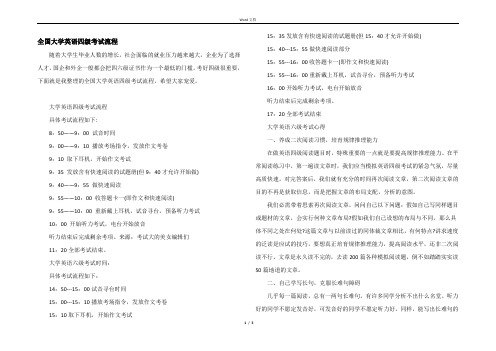
全国大学英语四级考试流程随着大学生毕业人数的增长,社会面临的就业压力越来越大,企业为了选择人才,国企和外企一般都会把四六级证书作为一个最低的门槛。
考好四级很重要,下面就是我整理的全国大学英语四级考试流程,希望大家宠爱。
大学英语四级考试流程具体考试流程如下:8:50——9:00 试音时间9:00——9:10 播放考场指令,发放作文考卷9:10 取下耳机,开始作文考试9:35 发放含有快速阅读的试题册(但9:40才允许开始做)9:40——9:55 做快速阅读9:55——10:00 收答题卡一(即作文和快速阅读)9:55——10:00 重新戴上耳机,试音寻台,预备听力考试10:00 开始听力考试,电台开始放音听力结束后完成剩余考项。
来源:考试大的美女编辑们11:20全部考试结束。
大学英语六级考试时间:具体考试流程如下:14:50---15:00试音寻台时间15:00---15:10播放考场指令,发放作文考卷15:10取下耳机,开始作文考试15:35发放含有快速阅读的试题册(但15:40才允许开始做)15:40---15:55做快速阅读部分15:55---16:00收答题卡一(即作文和快速阅读)15:55---16:00重新戴上耳机,试音寻台,预备听力考试16:00开始听力考试,电台开始放音听力结束后完成剩余考项。
17:20全部考试结束大学英语六级考试心得一、养成二次阅读习惯,培育规律推理能力在做英语四级阅读题目时,特殊重要的一点就是要提高规律推理能力。
在平常阅读练习中,第一遍读文章时,我们应当模拟英语四级考试的紧急气氛,尽量高质快速。
对完答案后,我们就有充分的时间再次阅读文章,第二次阅读文章的目的不再是获取信息,而是把握文章的布局支配,分析的意图。
我们必需带着思索再次阅读文章,问问自己以下问题:假如自己写同样题目或题材的文章,会实行何种文章布局?假如我们自己设想的布局与不同,那么具体不同之处在何处?这篇文章与以前读过的同体裁文章相比,有何特点?讲求速度的泛读是应试的技巧,要想真正培育规律推理能力,提高阅读水平,还非二次阅读不行。
英语四级考试真题及答案
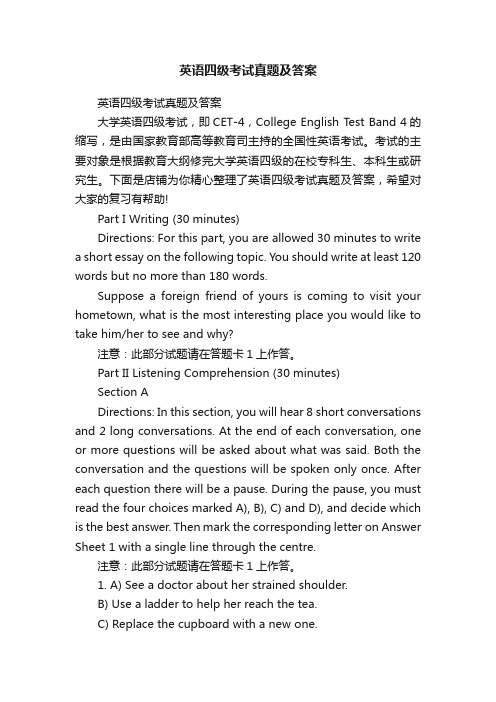
英语四级考试真题及答案英语四级考试真题及答案大学英语四级考试,即CET-4,College English Test Band 4的缩写,是由国家教育部高等教育司主持的全国性英语考试。
考试的主要对象是根据教育大纲修完大学英语四级的在校专科生、本科生或研究生。
下面是店铺为你精心整理了英语四级考试真题及答案,希望对大家的复习有帮助!Part I Writing (30 minutes)Directions: For this part, you are allowed 30 minutes to write a short essay on the following topic. You should write at least 120 words but no more than 180 words.Suppose a foreign friend of yours is coming to visit your hometown, what is the most interesting place you would like to take him/her to see and why?注意:此部分试题请在答题卡1上作答。
Part II Listening Comprehension (30 minutes)Section ADirections: In this section, you will hear 8 short conversations and 2 long conversations. At the end of each conversation, one or more questions will be asked about what was said. Both the conversation and the questions will be spoken only once. After each question there will be a pause. During the pause, you must read the four choices marked A), B), C) and D), and decide which is the best answer. Then mark the corresponding letter on Answer Sheet 1 with a single line through the centre.注意:此部分试题请在答题卡1上作答。
英语四级答题卡标准范文
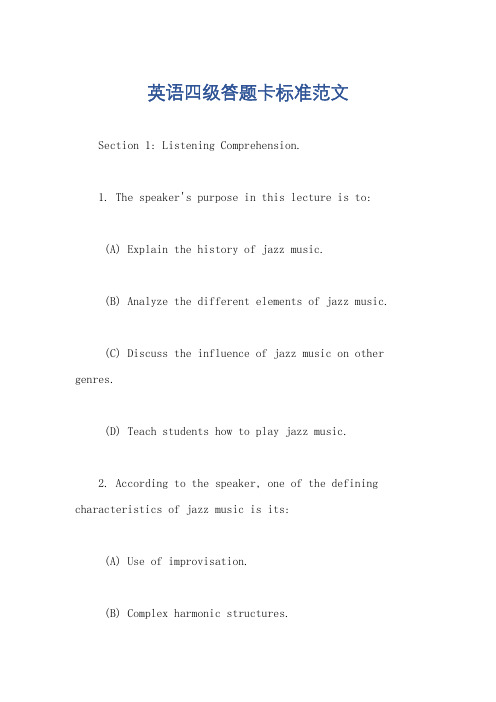
英语四级答题卡标准范文Section 1: Listening Comprehension.1. The speaker's purpose in this lecture is to:(A) Explain the history of jazz music.(B) Analyze the different elements of jazz music.(C) Discuss the influence of jazz music on other genres.(D) Teach students how to play jazz music.2. According to the speaker, one of the defining characteristics of jazz music is its:(A) Use of improvisation.(B) Complex harmonic structures.(C) Strict adherence to traditional forms.(D) Emphasis on melody.3. The speaker mentions that jazz music originated in the early 20th century in the city of:(A) New Orleans.(B) Chicago.(C) New York City.(D) Paris.4. Which of the following instruments is mentioned by the speaker as being typically used in jazz music?(A) Violin.(B) Saxophone.(C) Clarinet.(D) Flute.5. The speaker suggests that one of the reasons for the enduring popularity of jazz music is its:(A) Ability to adapt and evolve.(B) Accessibility to audiences of all ages.(C) Association with the civil rights movement.(D) Educational value.Section 2: Reading Comprehension.Passage 1。
